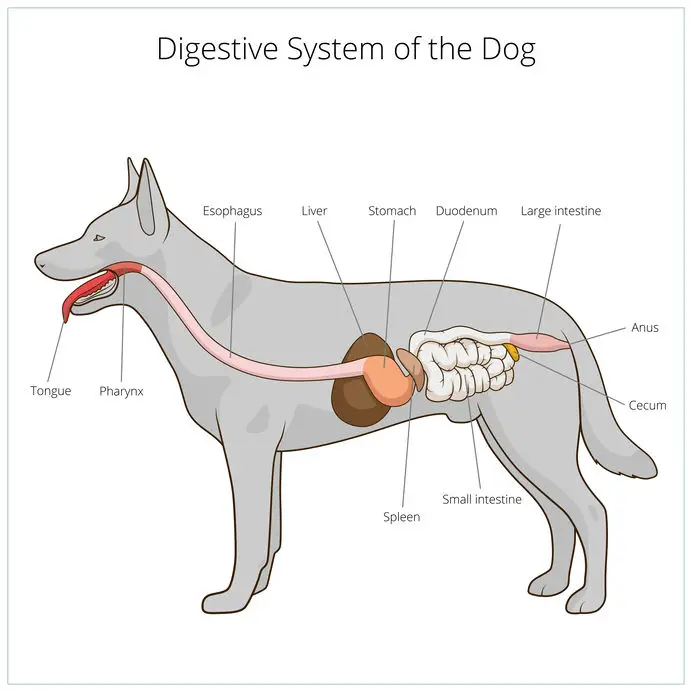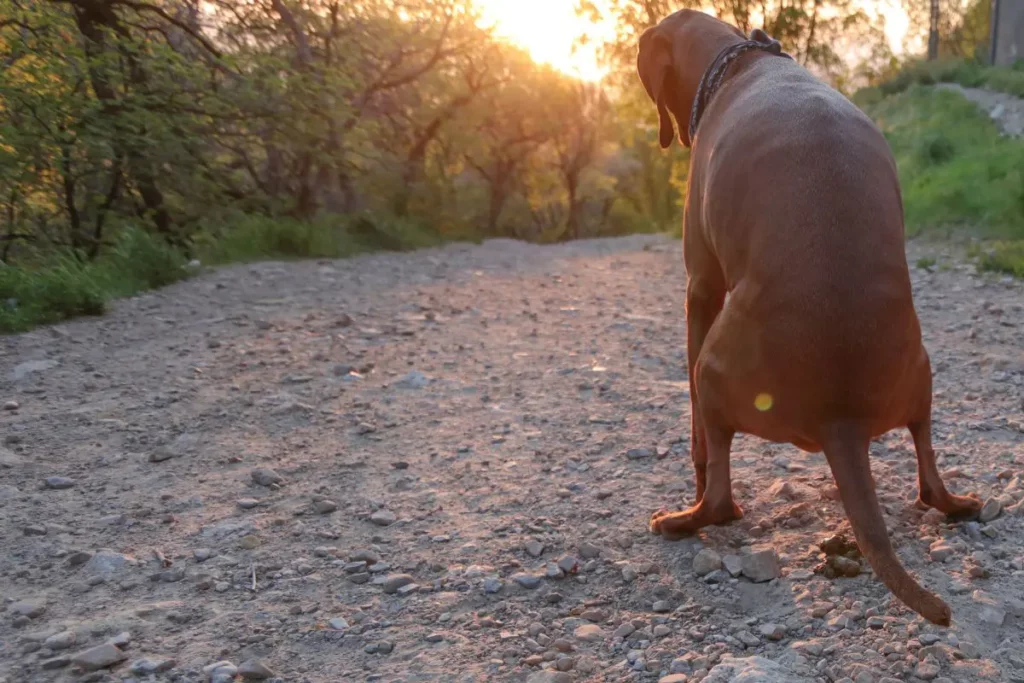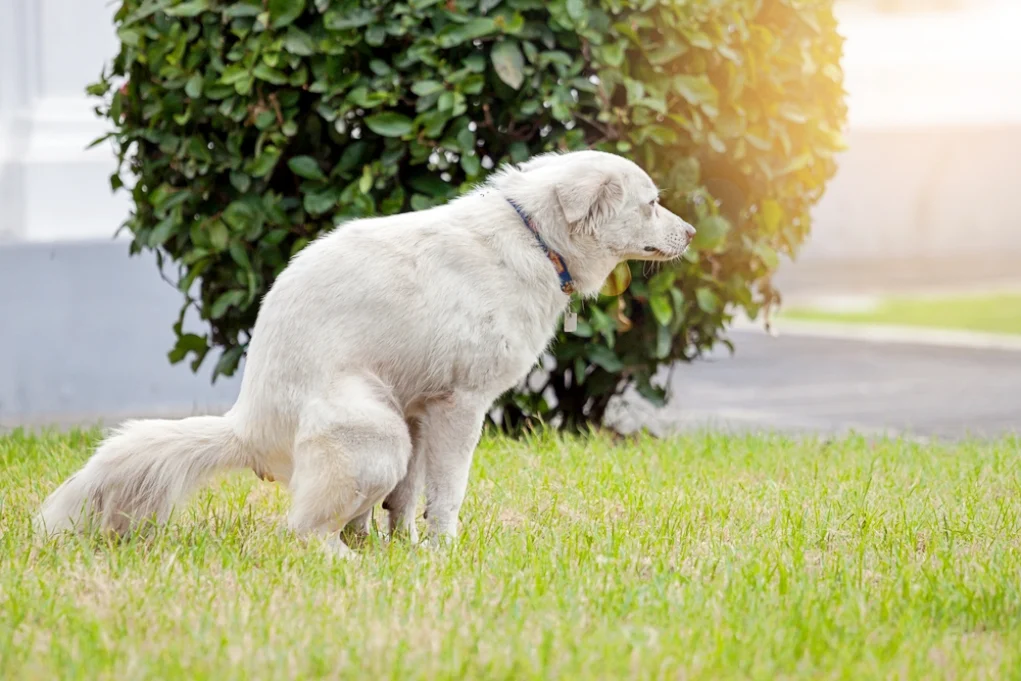How Long Can Dogs Go Without Pooping: A Comprehensive Guide
This article discusses factors affecting dogs’ bowel movements, signs of constipation or other health concerns, and how long dogs can go without pooping. Understanding your dog’s bathroom habits is crucial for health monitoring as changes can indicate stress, dietary issues, or other problems.
Influences on bowel movements can include age, diet, activity level, and health conditions. Though occasional irregularities may be normal, consistent changes can signal an issue. Ready to learn more about your furry friend’s health?
Let’s dive in…
Key takeaways
Dogs typically poop one to five times per day, but this can vary based on factors like diet, age, and health.
Irregular bowel movements can be a sign of dietary issues, stress, or health problems.
Dogs can usually go for 48 hours without pooping, but longer periods may indicate constipation or other issues.
If a dog hasn’t pooped for more than 48 hours, it’s recommended to consult a vet.
Regular exercise, a healthy diet, and sufficient hydration can support healthy bowel movements in dogs.
The Normal Frequency of Bowel Movements in Dogs
Just like humans, dogs’ bowel movement frequencies can vary. In this section, we will explore the typical range of daily bowel movements in dogs and the factors that can affect these frequencies.
Daily bowel movement variations
On average, most dogs will have a bowel movement one to two times per day. However, it’s important to note that this is just an average, and some dogs may have more or fewer bowel movements. Some dogs may only poop once a day, while others may go up to three times.
What’s most important is to understand what’s normal for your individual dog and monitor any significant changes in their routine.
Factors affecting frequency
Several factors can influence a dog’s bowel movement frequency, including:
- Age: Younger dogs and puppies often have more frequent bowel movements, as their digestive systems are still developing. As dogs age, their metabolism may slow down, leading to less frequent bowel movements.
- Diet: The type and quality of food your dog consumes can significantly impact their bowel movements. High-quality, easily digestible food can lead to more regular bowel movements, while low-quality food or a diet high in fillers may result in less frequent or irregular bowel movements.
- Activity level: Active dogs tend to have more regular bowel movements, as exercise can stimulate the digestive system. Less active dogs or those with sedentary lifestyles may have fewer bowel movements.
- Health conditions: Certain medical conditions, such as gastrointestinal disorders, metabolic issues, or neurological problems, can affect a dog’s bowel movement frequency. If you suspect a health issue is causing changes in your dog’s bathroom habits, consult your veterinarian for guidance.
Understanding these factors will help you better monitor your dog’s bowel movements and address any concerns that may arise.

How Long Can a Healthy Dog Go Without Pooping?
While most dogs have bowel movements once or twice a day, there might be instances when your dog doesn’t go for a more extended period. In this section, we’ll explore the typical timeframes for a healthy dog, situations when a dog may hold it longer, and the upper limit of normality.
Typical timeframes
A healthy dog may occasionally go without pooping for up to 48 hours. This duration can vary depending on individual factors, such as the dog’s age, diet, and activity level. It’s essential to pay attention to your dog’s normal habits and note any significant deviations from their routine.
Instances when a dog may hold it longer
There are several situations in which a dog may hold their bowel movement longer than usual:
- Stress or anxiety: Changes in routine, unfamiliar environments, or travel can cause stress or anxiety in dogs, which may lead to them holding their bowel movements longer than usual.
- Limited access to a suitable area: If a dog doesn’t have access to an appropriate place to poop or is uncomfortable with their environment, they may hold their bowel movement.
- Weather conditions: Some dogs may be reluctant to poop during extreme weather conditions, such as heavy rain, snow, or extreme temperatures.
The upper limit of normality
If your dog has not had a bowel movement for more than 48 to 72 hours, it could be a cause for concern. This extended duration may indicate constipation or an underlying health issue that requires veterinary attention. Monitoring your dog’s bowel movements and seeking help when necessary is crucial to maintaining their overall well-being.

Causes of Irregular Bowel Movements in Dogs
Occasionally, you may notice that your dog’s bowel movements become irregular or infrequent. There are various reasons this can happen, and understanding these causes can help you address any issues and maintain your dog’s health. Here are some common causes of irregular bowel movements in dogs:
Dietary changes
Sudden changes in your dog’s diet can disrupt their digestive system, leading to irregular bowel movements. Transitioning to a new type of food should be done gradually to allow your dog’s system to adjust properly. Additionally, consuming too many treats or table scraps can also result in irregular bowel movements.
Stress or anxiety
As mentioned earlier, stress or anxiety can cause your dog to hold their bowel movements for longer periods. Moving to a new home, changes in family dynamics, or other significant life events can create stress for your dog and affect their bathroom habits.
Dehydration
Dehydration can lead to hard, dry stools that are difficult for your dog to pass, resulting in irregular bowel movements or constipation. Ensure your dog has access to clean water at all times, and monitor their water intake, especially during hot weather or periods of increased activity.
Medications or supplements
Certain medications or supplements can cause changes in your dog’s bowel movements. If you’ve recently started your dog on a new medication or supplement, consult your veterinarian to determine if this could be the cause of the irregularity.
Medical conditions
Various medical conditions can affect a dog’s bowel movements, including gastrointestinal disorders, metabolic issues, neurological problems, or even an obstruction in the digestive tract. If your dog’s irregular bowel movements persist or are accompanied by other concerning symptoms, consult your veterinarian for a thorough evaluation and appropriate treatment.
Understanding these potential causes can help you identify and address any issues with your dog’s bowel movements, ensuring their continued health and well-being.
Recognizing Dog Constipation
Constipation is a common issue that can affect dogs of all ages and breeds. It’s essential to recognize the signs of constipation in your dog so you can take appropriate action and ensure their comfort and well-being. In this section, we’ll discuss the signs and symptoms of constipation, when to seek help, and the risks associated with constipation.
Signs and symptoms
Constipation in dogs can present with various signs and symptoms. Here are some common indicators that your dog may be constipated:
- Straining during bowel movements
- Producing small, hard, or dry stools
- Passing mucus or blood in the stool
- Frequent, unproductive attempts to defecate
- Loss of appetite or lethargy
- Abdominal pain or discomfort
Duration of constipation before seeking help
If your dog exhibits signs of constipation for more than 48 hours, it’s time to consult your veterinarian. Delaying treatment may exacerbate the issue and increase the risk of complications. In some cases, constipation can be a sign of an underlying health issue that requires prompt attention.
Risks associated with constipation
When left untreated, constipation can lead to several complications, including:
- Impaction: Severe constipation can cause fecal impaction, which is a blockage of hardened stool in the colon. This condition can be painful and may require medical intervention to resolve.
- Megacolon: Chronic constipation can lead to a condition called megacolon, where the colon becomes enlarged and loses its ability to function properly.
- Dehydration: Constipated dogs are at risk of becoming dehydrated due to the loss of fluids in the stool, which can lead to further complications.
By recognizing the signs of constipation and seeking help when necessary, you can help keep your dog healthy and comfortable.
How to Help Your Dog with Constipation
If you suspect that your dog is constipated, there are several steps you can take to help them find relief. In this section, we’ll discuss home remedies, over-the-counter treatments, and when to consult a veterinarian for assistance.
Home remedies
Before turning to medications, you may try some home remedies to alleviate your dog’s constipation:
- Dietary adjustments: Adding fiber to your dog’s diet can help soften their stools and promote regular bowel movements. You can try adding canned pumpkin (not pumpkin pie filling), cooked green beans, or a small amount of bran to their food.
- Exercise and activity: Encourage your dog to engage in regular exercise, as physical activity can help stimulate bowel movements. A brisk walk or a game of fetch may help get things moving.
- Hydration: Ensuring that your dog has access to clean, fresh water is vital for preventing and treating constipation. Dehydration can contribute to constipation, so monitor your dog’s water intake and encourage them to drink more if needed.

Over-the-counter treatments
If home remedies don’t provide relief, you may consider over-the-counter treatments to help your dog. Laxatives or stool softeners specifically designed for dogs can be helpful, but it’s essential to consult your veterinarian before using any over-the-counter products to ensure they’re safe and appropriate for your dog’s specific situation.
When to consult a veterinarian
If your dog’s constipation persists or worsens despite home remedies and over-the-counter treatments, it’s time to consult your veterinarian. Your vet can perform a thorough examination, determine the cause of your dog’s constipation, and recommend the most appropriate treatment, which may include prescription medications, enemas, or even surgery in severe cases.
By trying home remedies, considering over-the-counter treatments, and consulting a veterinarian when necessary, you can help your dog find relief from constipation and maintain their overall well-being.
Preventing Constipation in Dogs
Prevention is always better than cure, and this holds true for constipation in dogs as well. In this section, we’ll discuss ways to help prevent constipation in your furry friend, ensuring they remain healthy and comfortable.
1. Balanced diet and nutrition
Feeding your dog a high-quality, well-balanced diet is crucial for maintaining their overall health, including their digestive system. Ensure that their food contains an appropriate amount of fiber and avoid overfeeding them with treats or table scraps, which can contribute to constipation.
2. Regular exercise
Physical activity plays a significant role in preventing constipation. Regular exercise helps stimulate your dog’s digestive system and promotes healthy bowel movements. Incorporate daily walks, playtime, or other forms of physical activity into your dog’s routine to support their digestive health.
3. Maintaining a consistent routine
Dogs thrive on consistency, and this includes their bathroom habits. Establishing a regular schedule for walks and bathroom breaks can help prevent constipation by encouraging routine bowel movements. Be mindful of any changes in your dog’s environment or schedule that may cause stress, as this can contribute to constipation.
4. Monitoring for signs of constipation
Regularly monitoring your dog’s bowel movements can help you identify potential issues early. Familiarize yourself with your dog’s typical bathroom habits and be attentive to any changes in frequency, consistency, or appearance of their stools.
Addressing constipation or irregularities early on can help prevent complications and keep your dog feeling their best.
By focusing on these preventative measures, you can help ensure that your dog maintains regular, healthy bowel movements and minimize the risk of constipation.
Frequently Asked Questions
Can certain dog breeds be more prone to constipation?
While constipation can affect any dog breed, some breeds may be more prone to gastrointestinal issues or have a higher risk of developing conditions that can contribute to constipation. Breeds with congenital spinal issues, such as French Bulldogs or Dachshunds, may have a higher risk of constipation due to their anatomy. However, it’s essential to note that individual factors, such as diet, exercise, and overall health, play a significant role in constipation risk.
How long does it take for a dog to poop after eating?
The time it takes for a dog to poop after eating can vary based on factors such as age, diet, and individual metabolism. Generally, it can take anywhere from a few hours to 24 hours for a dog to have a bowel movement after eating. Most dogs will have a bowel movement within 12 hours of consuming a meal.
Can a dog’s bowel movement schedule change as they age?
Yes, a dog’s bowel movement schedule can change as they age. As dogs grow older, their metabolism may slow down, and their activity levels may decrease, leading to less frequent bowel movements. It’s essential to monitor your dog’s bathroom habits throughout their life and adjust their care accordingly.
Are there any specific foods to avoid that may cause constipation in dogs?
Feeding your dog a high-quality, well-balanced diet is crucial for preventing constipation. Avoid giving your dog foods high in fat or low in fiber, as these can contribute to constipation. Also, limit table scraps and excessive treats, as these can disrupt their digestive system and lead to irregular bowel movements.
Can weather changes affect a dog’s bowel movements?
Yes, weather changes can affect a dog’s bowel movements. Some dogs may be reluctant to poop during extreme weather conditions, such as heavy rain, snow, or extreme temperatures. This reluctance could lead to them holding their bowel movements longer than usual, potentially resulting in constipation.
How do I know if my dog’s constipation is a sign of a more serious health issue?
If your dog’s constipation persists for more than 48 hours or is accompanied by other concerning symptoms, such as loss of appetite, lethargy, vomiting, abdominal pain, or blood in the stool, it may be a sign of a more serious health issue. In such cases, it’s crucial to consult your veterinarian for a thorough evaluation and appropriate treatment.
Final Thoughts
As we wrap up our comprehensive guide on how long dogs can go without pooping, let’s recap the key points we’ve covered:
- The average dog has a bowel movement one to two times per day, but this can vary depending on factors such as age, diet, activity level, and health conditions.
- A healthy dog may go without pooping for up to 48 hours, but any longer than that may indicate constipation or an underlying health issue.
- Recognizing the signs of constipation and addressing it early can help prevent complications and maintain your dog’s well-being.
- Home remedies, over-the-counter treatments, and veterinary care can help alleviate constipation in dogs.
- Preventing constipation involves a balanced diet, regular exercise, maintaining a consistent routine, and monitoring for signs of constipation.
Monitoring your dog’s bowel movements is an essential aspect of being a responsible pet owner. It allows you to quickly identify any irregularities and take appropriate action to ensure your dog’s health and comfort.
When in doubt, always consult your veterinarian for guidance and assistance. By understanding your dog’s bathroom habits and taking a proactive approach to their well-being, you’ll be well-equipped to care for your furry friend and enjoy a happy, healthy life together.






